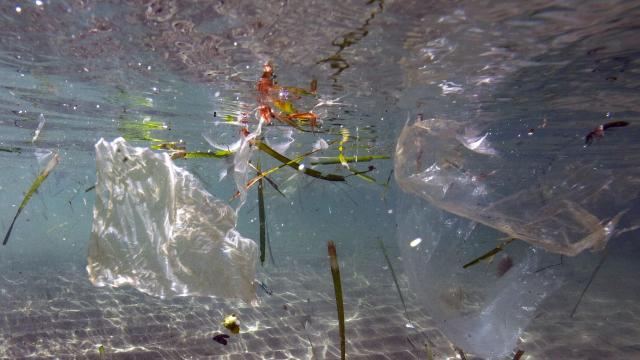The world is on track to triple the amount of plastic we dump into the ocean in just two decades. But if civic and business leaders get their shit together to curb the global plastics crisis, we could reduce that rate by 80 per cent, according to two new reports on Thursday.
The world produces hundreds of millions of tons of plastic every year, and 40 per cent of it ends up polluting the ocean or land. In 2016, 11 million metric tons of plastic got into the ocean, where it can kill sea creatures, screw up entire marine ecosystems, and affect human health.
That impact is only expected to grow: Global Plastic production is expected to double by 2040. The new studies ” one by the Pew Charitable Trusts and SYSTEMIQ and one in the journal Science ” shows we could see 1.3 billion metric tons of plastic pollute our water and land by 2040 if the world does nothing. Under that scenario, the amount of plastic entering the oceans each year would grow to 29 million metric tons per year by 2040.
“That’s one of the most alarming statistics we found,” Sarah Baulch, an associate at Pew Charitable Trusts, told Gizmodo.
[referenced url=”https://gizmodo.com.au/2020/07/cars-emit-more-than-carbon-pollution-they-release-microplastic-too/” thumb=”https://gizmodo.com.au/wp-content/uploads/2020/07/15/tcy2wnuphymgouxydahi-300×169.jpg” title=”Cars Emit More Than Carbon Pollution ” They Release Microplastic, Too” excerpt=”When you take your car for a spin, it’s not just emitting particulate matter and greenhouse gases. The wear and tear of your car’s tires and brakes release microplastic, which winds, rains, and snow can carry to the most remote parts of the world.”]
It’s not too late, however, for the world to change course. By collaborating with experts all over the world, the authors developed a first-of-its-kind economic model to quantify the rate and scale at which plastic would enter the ocean by 2040. That allowed them to model the changes if we reduce plastic production, recycling, and use. The analysis also included a business as usual look at what happens if no new policies are enacted. Judith Enck, a former Environmental Protection Agency regional administrator and president of Beyond Plastics, said the report demonstrates how urgently we need to get started.
“We are heading into a very dangerous situation,” she told Gizmodo in an email.
The findings show if government’s follow through on their current commitments to reduce plastic like the European Union’s ban on single-use items, they would only reduce annual plastic flow into the ocean by 7%. Other scenarios they modelled are more positive, though, if governments focus on removing plastic subsidies and decreasing production, increasing waste collection, and increasing global recycling capacity.
“These are all based on solutions that have been proposed around the world,” Yonathan Shiran, program director at the London-based think tank SYSTEMIQ, told Gizmodo.
On their own, no single solution would bring the annual rate of plastic entering the ocean below even 2016 levels by 2040. Even a highly ambitious recycling strategy that includes scaling up collection, sorting, and recycling infrastructure, for instance, would still result in ocean plastic pollution 65% above 2016 levels in 2040.
It’s clear there’s no silver bullet. But combining policies and practices that reduce demand, redesign products and switching to paper substitutes in some sectors, and scaling up collection, sorting, and recycling rates yields a better outcome. If all of these strategies were employed at the rates that it’s technically feasible to do so right now, by 2040, the world could lower the rate of plastic flow into the ocean by 52% below 2016 levels. That would also come with a massive reduction in greenhouse gas emissions thanks to decreased oil use for plastic production.
Countries would have to make massive investments to up recycling capacity and change production. But crucially, it would make plastic waste management less costly to governments than not making any changes. Overall, the world could save $US70 ($98) billion by 2040 if it follows a path to reduce plastic waste compared to the do-nothing scenario.
“That is driven largely by the fact that if you have less plastic in the market … that is much cheaper over time, because you decrease production,” said Shiran, which would reduce the need for recycling facilities and involve fewer subsidies.
The best case scenario wouldn’t completely eliminate the problem of plastic pollution, though. There would still be between 4 and 7 million metric tons of plastic entering the ocean in 2040. Eliminating that pollution would require technological advances and new business models. Plastic pollution, after all, comes from all sorts of things, including unexpected sources like our cars. Getting rid of all plastic pollution would require the overhaul of basically every economic sector.
“This is really a big challenge because it requires many different stakeholders, often with different interests to work together towards a shared objective,” said Shiran.
But the report shows world leaders have the resources to make a huge dent in our plastic problem. Doing so would require making changes and, importantly, taking on the fossil fuel industry. But for the health of our planet, it’s the only ethical choice.
“We’re already seeing very severe impacts on communities on our environment,” said Baulch. “And what this study really shows us is that we’re at a crossroads at this point, and we have to make a choice as to what future we want.”
